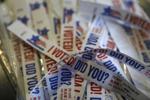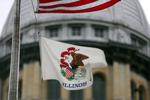[ad_1]
In the recent competition for cannabis business licenses in Illinois, Ambrose Jackson’s team struck gold. They won rights to both grow and sell their own cannabis. Jackson is quitting his health care management job to commit full time to becoming a legal marijuana business owner.
But he’s anxious about it, because now the hard part starts for license holders — hustling for funding. Like contestants on the TV show “Shark Tank,” they must sell themselves and their plans to get the millions of dollars they need to get started.
Because cannabis remains illegal under federal law, many banks won’t lend to cannabis companies. So weed entrepreneurs like Jackson are exploring innovative ways to raise cash. It may require an unusual business plan, working with competitors, and some help from lawmakers.
“There’s lots of interest in Illinois,” Jackson said. “A lot of people are trying to figure out how they can create the best deal.”
One option is to seek a loan through the Illinois Department of Commerce and Economic Opportunity. DCEO has about $17 million, generated from cannabis sales, for loans to license holders who qualify as “social equity” applicants. Social equity means they or a close family member had a prior low-level marijuana arrest or conviction, were from an area with high rates of poverty or cannabis arrests, or companies that have more than half their employees meet those criteria.
Administrators expect to loan up to $500,000 to each craft grower, and $250,000 to each dispensary, agency spokesperson Lauren Huffman said. As of Sept. 15, 18 license winners have applied for the loans, with a Sept. 30 deadline approaching. Two private partners, Good Tree Capital and Credit Union 1, will also provide financing under the program.
Keith Cooper, CEO of Boston-based Revolutionary Clinics, discusses the journey his company has taken to become one of the fastest-growing in the country, despite regulatory hurdles and an uncertain market.
In general, loans will likely have a five-year term and have an interest rate of 8% or less — among the lowest in the nation for cannabis businesses, which can pay three times as much for operating in what’s considered a risky market.
The state loans won’t cover all they need, but will help confer their legitimacy to other lenders, Good Tree Capital founder and CEO Seke Ballard said. Research has shown people of color typically have a harder time getting loans, he said, so the program aims to counter that.
“It really is a bunch of sharks circling these businesses, and loan sharks are a part of them,” Ballard said. “The comparative attractiveness of this loan program looks better and better.”
Illinois’ approval of new licenses was delayed by more than a year because of problems with the scoring of applications and resulting lawsuits. This summer, Gov. J.B. Pritzker’s administration awarded craft grower, infuser and transporter licenses, and held three lotteries to award licenses for retail stores, known as dispensaries.
But a Cook County judge has indefinitely prevented the state from awarding the retail store licenses until he rules on a lawsuit challenging the process. The delay is hurting investors who already spent money for a year to hold property or employees while generating no income.
Some existing or wealthy license winners may have money to start their businesses. But most newcomers must borrow funds or sell shares of ownership.
Cannabis service providers have been holding meetings to initiate business deals with the new lottery winners. The Arcview Group held a seminar last week that addressed, in part, how investors can buy into the new Illinois licenses.
Green Check Verified, which runs a software platform to coordinate cannabis banking, will hold a boot camp on the subject Tuesday. Green Check works with dozens of financial institutions and 1,300 cannabis businesses in 32 states. CEO and founder Kevin Hart said banks and credit unions are increasingly willing to venture into the new field.
To do so, each lender has to verify that the borrower is legitimate and will follow the complex cannabis regulations. Hart cited the example of two businessmen in California who were sentenced to prison for bank fraud, for tricking banks into processing credit card payments for cannabis delivery company Eaze.

Marijuana plants in growing room at Cresco Labs in Joliet on Dec. 17, 2019.
“That’s the challenge: How do financial institutions know they’re letting good money in and bad money out?” Hart said.
To increase the borrowing value of their licenses, craft growers are hoping that state lawmakers will approve a plan to increase the size of their facilities from 5,000 square feet to 14,000 square feet and beyond.
As for Jackson, his group is working on a deal to have a large investment company pay for a cultivation warehouse and lease it back to them, an increasingly common practice in the cannabis industry. Jackson’s group, which includes owners from social equity neighborhoods, is also looking for private investors and other social equity companies to combine forces and create a bigger company with multiple retail stores.
“If you want to partner with like-minded individuals and create something with a similar mission and goals, let’s work together,” he said. “Nobody’s going to be successful as an independent by themselves for too long.”
See the new Illinois laws that took effect July 1
665 bills

The Democrat-controlled Illinois General Assembly approved 665 bills this legislative session, with the vast majority awaiting Gov. J.B. Pritzker’s signature.
But, Pritzker has signed 42 bills into law. A handful of those will take effect Jan. 1, 2022, but most went into effect immediately upon signing or will take effect this Thursday.
Here are some notable new laws in effect now or on Thursday that Illinoisans should know.
Election reform

With pandemic-related delays to U.S. Census redistricting numbers, lawmakers moved back the state’s 2022 primary election from March 15 to June 28. The legislation also makes Election Day a state holiday, requires every county to have at least one universal voting center and allow people to be added to a permanent vote-by-mail list. (SB825)
Vote by mail

Some pandemic-induced changes to voting for the 2020 general election, such as vote-by-mail and curbside drop-off, will now be permanent features of future elections. (House Bill 1871)
State legislative redistricting

As they are tasked with doing every 10 years, lawmakers approved new district boundaries for the Illinois House and Senate. The Democrat-drawn maps, which utilized the U.S. Census’ American Community Survey instead of waiting for the decennial census numbers that will arrive later this year, have been challenged in court by Republicans and some other groups. (HB2777)
Illinois Supreme Court redistricting

The seven-person Illinois Supreme Court’s district boundaries were successfully redrawn for the first time since the 1960s. (SB642)
Police reform

There was no more controversial bill that passed this year than House Bill 3653, also known as the SAFE-T Act, which passed during the lame duck session this January. The provisions ending cash bail and requiring all police to wear body cameras will not take effect until 2023 and 2025, respectively. But starting Thursday, police will be required to render aid to the injured, intervene when a fellow officer is using excessive force and and be limited in use of force. It also offers stricter guidelines for the decertification of officers and would allow people to file anonymous complaints of police misconduct. (HB3653)
Payday loans

Lenders are now prohibited from charging more than 36% annual percentage rate on consumer loans. The average rate in Illinois was nearly 300% prior to the law’s signing. (SB1792)
Vaccine lottery

Tucked into the state’s fiscal year 2022 budget is $10 million for a “vaccine lottery.” All Illinois residents vaccinated by July 1 will be automatically entered into the contest. It includes $7 million in cash prizes to vaccinated adults, ranging from $100,000 to $1 million, and $3 million in scholarship awards to vaccinated youth. (SB2800)
COVID-19 emergency housing

Created guidelines for distributing more than $1 billion in federal stimulus funds for COVID-related housing relief. Also creates automatic sealing of evictions during the pandemic. (SB2877)
Pretrial interest

Victims in personal injury and wrongful death cases will be allowed to collect interest from defendants from the time a lawsuit is filed. It is meant to incentivize settlement of these cases. It was supported by the trial lawyers and opposed by business groups. (SB72)
Casino labor

All casino applicants in Illinois are now required to enter into a project-labor agreement when seeking a new or renewed license. (SB1360)
Crime victims compensation

Provides that a victim’s criminal history or felony status shall not automatically prevent compensation to that victim or the victim’s family. Extends the applicant’s period for submitting requested information to 45 days from 30 days and provides that a final award shall not exceed $45,000, up from $27,000, for a crime committed on or after August 7, 2022. (HB3295)
Electronic signature

Provides that a contract, record, or signature may not be denied legal effect or enforceability simply because it is in electronic form or an electronic record was used in its formation. Provides that if a law requires a record to be in writing, an electronic record satisfies the law. (SB2176)
[ad_2]
Source link
